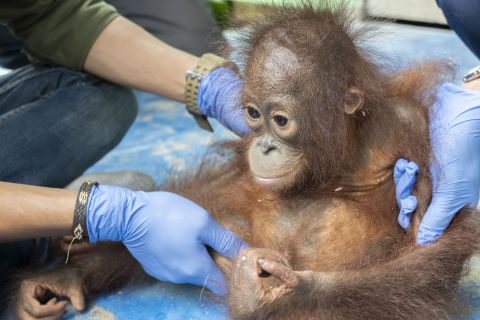
A baby orangutan that was being kept illegally as a pet in a small wooden crate has been rescued from a remote rural village in West Borneo The little female named Covita was removed by the Wildlife Rescue Unit (WRU) of the Natural Resources Conservation Agency (BKSDA), supported by a team from IAR Indonesia.
The infant was handed over to them in Ampon Hamlet, Krio Hulu Village in the District of Ketapang on Saturday 29 August. According to the man keeping the orangutan, he had found her while working in the forest. He said she was suffering from an injury to her right leg. He took her home where he kept her chained up.
He fed her on rice, cashew nuts, sugary water and sweet condensed milk. Covita’s rescue was triggered when a local villager who knew it was illegal to keep an orangutan as a pet heard about the infant. He urged her ‘owner’ to surrender her to the authorities.
However, because the village of Ensayang where the man lives is so remote, he took Covita to Ampon Hamlet which is more easily accessible.
In spite of this, after setting off from IAR’s Orangutan Centre in Ketapang, the rescue team had to travel for eight hours by road followed by three hours by motorboat in order to reach the hamlet. Judging by the results of a dental examination carried out by IAR veterinarian Dr Adisa, Covita is estimated to be about 2.5 years old.
She has a number of lumps on her right thigh bone which are probably the result of the injury she sustained when she was found in the forest. Covita is also suffering from a skin disease which is causing some of her skin to peel off and the hair on her legs and back to fall out. Covita was transported to IAR’s rehabilitation centre in the village of Sungai Awan, Ketapang District.
Here she will be kept in quarantine for eight weeks and undergo further thorough medical examinations to ensure she is not carrying any diseases that could be transmitted to other orangutans at the centre.
This is the second time IAR Indonesia and the West Kalimantan BKSDA have rescued an orangutan from this hamlet. In the middle of 2019, the joint team rescued a baby orangutan that was also being kept illegally as a pet.
In addition to threatening the sustainability of wildlife, irresponsible behaviour like this also puts humans at risk of diseases that may be carried by wildlife. “In times of pandemics such as the one we are currently experiencing, the surrender of protected wildlife can reduce the risk of infectious diseases,” said Tantyo Bangun, Chairman of IAR Indonesia. “Hopefully Covita’s quarantine and rehabilitation will go well so that she can eventually be released into her natural habitat in the rainforest of Kalimantan.”
According to the Head of the BKSDA West, Sadtata Noor Adirahmanta, the keeping of illegal wild animals can have a negative impact on both parties. “In terms of the animal, captivity can cause changes in natural behaviour and it also jeopardises the safety and health of humans living in the vicinity,” he explained. “In addition, orangutan DNA, which is very similar to humans, means the animal can be an intermediary for the transmission of diseases to humans.
Likewise, humans can transmit the diseases they carry to orangutans. If the transmission process is fast, it is possible that a widespread health disaster will occur.
Therefore, keeping a distance from wild animals is a good thing for both parties,” he added. The change in the natural behaviour of a pet orangutan is a great loss to the animal because it will make it difficult for it to survive in the wild.
Such orangutans are not able to recognise their natural food, are not able to adapt to their environment, and so on. “We thank IAR Indonesia, which is located in Ketapang Regency and runs an orangutan rehabilitation centre in West Kalimantan. Hopefully Covita can undergo rehabilitation there until one day she is ready to be returned to her home in the wild,” he concluded.
Alan Knight OBE, IAR Chief Executive, said: “If this deadly pandemic teaches us one thing, it should be that wildlife belongs in the wild: that is the safest place for it as far as animals and people are concerned. And equally, the most dangerous place, as far as both people and animals are concerned, is for wildlife to be in the hands of human beings. That is a lesson we can no longer afford to ignore.”

